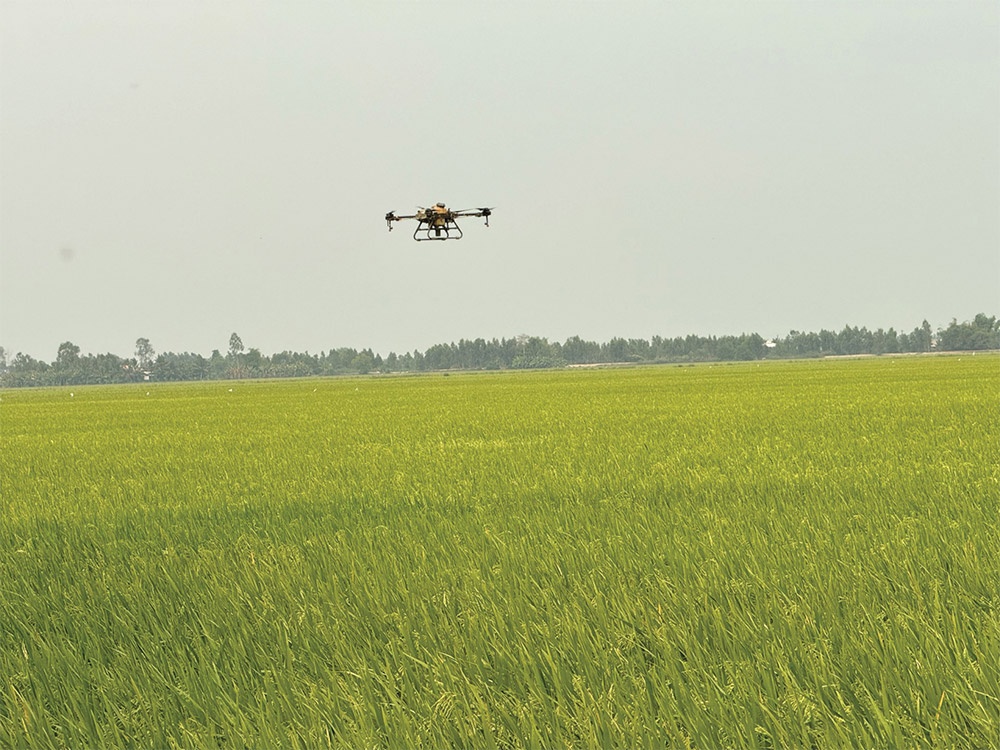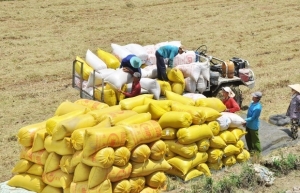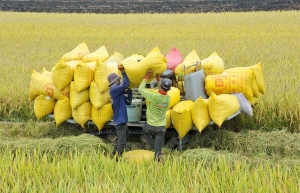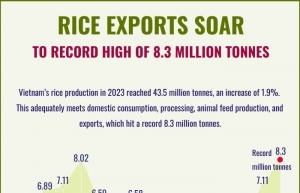Low emissions to stem from advances in rice
SunRice, Australia’s largest rice production group, will start construction of a $3.8 million project in the Mekong Delta province of Dong Thap in May, marking deeper participation in the rice supply chain in Vietnam and responding to government initiatives.
At a working session with Dong Thap leaders in early April, representatives of the group said the new project would focus on building a rice silo system at its factory in Lap Vo district. The system will help businesses optimise rice purchasing during the peak harvest season, increase storage capacity, and ensure the factory operates continuously throughout the year.
SunRice Group entered Vietnam in 2018 through ownership of Ricegrowers Vietnam in Dong Thap. Since its inception, the company has prioritised investing resources in technology in agricultural production, such as using drones to spray pesticides in rice fields and applying machinery to growing rice to reduce emissions, ensuring farmers have a safe, sustainable, and highly productive working environment.
“SunRice’s rice export output this year is expected to double compared to last year,” said Nguyen Phuc Trai, general director of Ricegrowers Vietnam. “In 2023, the company exported 100,000 tonnes of rice, an increase of 7 per cent compared to the plan. We expect that by the end of 2024, the figure will increase to 200,000 tonnes.”
Since 2022, Ricegrowers Vietnam has been coordinating with the Australian Centre for International Agricultural Research to develop a supply chain in the Mekong Delta region with the goal of developing high-yield and high-quality rice varieties for the international market.
“We focus on three goals: improving the quality of Vietnamese rice, bringing rice products to high-end markets, and contributing to increasing income for farmers in the delta. The connection between small farmers to high-end markets in Europe and South Korea has been initially successful and rice products have been positively received by customers,” Trai said.
 |
| Low emissions to stem from advances in rice, photo Le Toan |
Vietnam is currently the third-largest rice exporter in the world, after India and Thailand. According to the Ministry of Agriculture and Rural Development, Vietnam’s rice exports reached more than 2.1 million tonnes in the first quarter of 2024, worth $1.4 billion, an on-year increase of about 42 per cent. Vietnam’s main rice export markets are the Philippines, Indonesia, China, Ghana, Malaysia, and Singapore.
With the desire to diversify the market and improve the quality of Vietnamese rice, the government has approved a sustainable development project of ensuring one million hectares specialising in high-quality rice cultivation with lower emissions in the Mekong Delta, as a solution to stimulate the rise of the top rice granary in the country.
The project’s goal is to reduce the amount of chemical fertilisers and pesticides of chemical origin by 30 per cent, and decrease the amount of irrigation water by 20 per cent when compared to traditional farming.
Aside from the goals, the high-quality cultivated rice products are very popular with demanding export markets, contributing to increasing the rice chain by up to 40 per cent and bringing profit margins of over 50 per cent to growers.
Tran Truong Tan Tai, general director of VinaRice, said that building a high-quality and stable rice brand for export is the reason why the business was paying more attention to testing and replicating high-quality rice fields.
“Supporting the government’s rice goals is not only a way to protect the Vietnamese rice brand, but also a way to motivate businesses to continue bringing high-quality products to the global market,” Tai said.
VinaRice owns a 32-hectare rice field model in Tam Nong district of Dong Thap and aims to expand it further by the end of this decade. VinaRice will also be the focal point for technical training, seed supply, monitoring, evaluation, and product purchasing for farmers.
According to Nguyen Duy Thuan, CEO of Loc Troi Group, if the government’s low-emission rice growing programme is to be effective, it must inspire farmers to change their working habits.
When cooperating with Loc Troi, farmers will reduce the risk of chemical exposure because the company deploys a footprint-free field model, using drones to spray chemicals instead of letting farmers spray manually as before. Using drones also limits the amount of water per spray, from 300 litres per ha to only 17 litres.
Loc Troi began researching the low-carbon rice growing programme in 2016 and put it into practice in 2019. Since then, the enterprise has been among the most effective in the world in terms of green production and low-carbon emissions.
“The biggest motivation comes from Loc Troi’s vision of becoming a sustainable agricultural company, protecting the environment, and ensuring a liveable rural environment for farmers,” Thuan said.
According to him, the business is capable of supplying 10 million carbon credits to the market each year at a price of about $5 each. The expected revenue from selling carbon credits could reach $50 million.
In 2024, Vietnam expects rice exports to hit $5 billion. Last year, it sold 8.13 million tonnes worth $4.7 billion, a record high in recent years.
 | Ministry building long-term strategy on rice exports, market stabilisation: official The Ministry of Industry and Trade (MoIT) is building a long-term strategy on rice export and market stabilisation, following bans by several countries, according to Deputy Director of the MoIT's Import-Export Department Tran Quoc Toan. |
 | Agro-forestry-fishery exports see bright prospects The new record export turnover of key agricultural produce contributed a pivotal role in the agricultural industry’s growth in 2023, and simultaneously paves the way for bright prospects in 2024. |
 | Rice exports soar to record 8.3 million tonnes Vietnam’s rice production in 2023 stood at 43.5 million tonnes, an increase of 1.9 per cent, adequately meeting domestic consumption, processing, animal feed production, and exports, which set a record of nearly 8.3 million tonnes. |
What the stars mean:
★ Poor ★ ★ Promising ★★★ Good ★★★★ Very good ★★★★★ Exceptional
Related Contents
Latest News
More News
- Masan Consumer names new deputy CEO to drive foods and beverages growth (February 23, 2026 | 20:52)
- Myriad risks ahead, but ones Vietnam can confront (February 20, 2026 | 15:02)
- Vietnam making the leap into AI and semiconductors (February 20, 2026 | 09:37)
- Funding must be activated for semiconductor success (February 20, 2026 | 09:20)
- Resilience as new benchmark for smarter infrastructure (February 19, 2026 | 20:35)
- A golden time to shine within ASEAN (February 19, 2026 | 20:22)
- Vietnam’s pivotal year for advancing sustainability (February 19, 2026 | 08:44)
- Strengthening the core role of industry and trade (February 19, 2026 | 08:35)
- Future orientations for healthcare improvements (February 19, 2026 | 08:29)
- Infrastructure orientations suitable for a new chapter (February 19, 2026 | 08:15)

 Tag:
Tag:



















 Mobile Version
Mobile Version